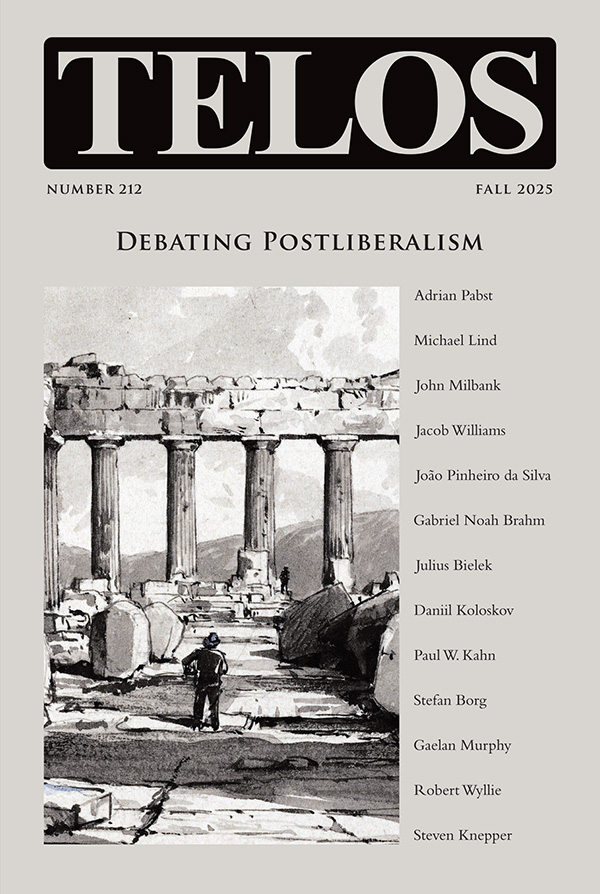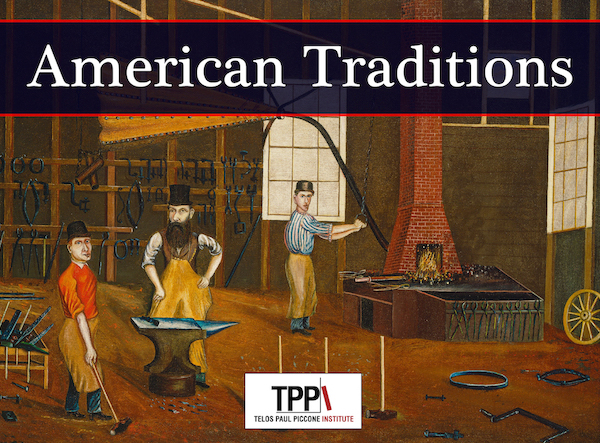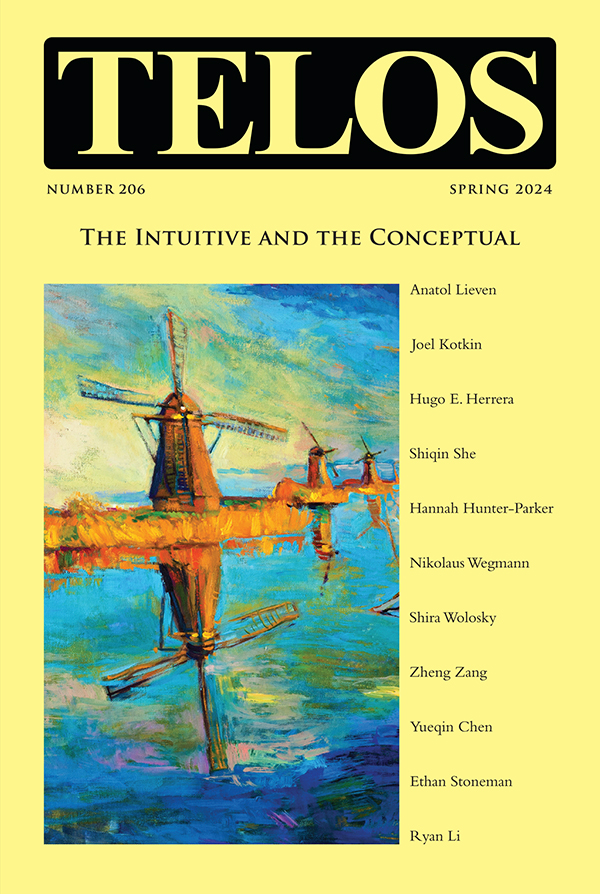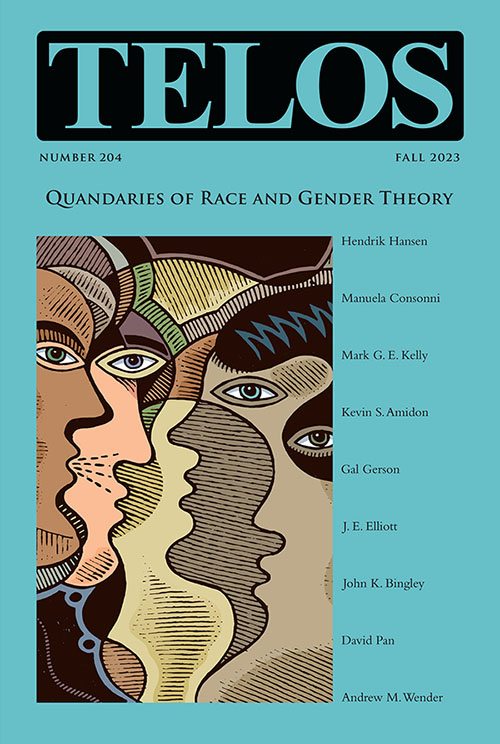By Adrian Pabst · Friday, October 3, 2025 Telos 212 (Fall 2025): Debating Postliberalism is now available for purchase in our store. Individual subscriptions to Telos are also available in both print and online formats.
 In 1998, Alan Wolfe remarked that “the right won the economic war, the left won the cultural war, and the center won the political war.” It was the age of triumphant liberalism, freed from the shackles of the Cold War confrontation between the capitalist West and the Communist East. Capitalism was now the uncontested model, as Western countries increasingly abandoned a more embedded social market economy in favor of the global market-state while emerging market economies embraced the state-market. In each case, society was the loser. Even as countries converged internationally and China morphed into an economic powerhouse, asset and income inequality increased within countries, and so did regional disparities—between the former heartlands of the Rust Belt and the new metropolitan hubs exemplified by Silicon Valley. Building on the writings of Paul Piccone and Christopher Lasch, critics of liberalism such as Christophe Guilluy, Nancy Fraser, Michael Lind, and Quinn Slobodian have highlighted the growing gulf between elite enclaves and peripheral wastelands, or hubs vs. heartlands, but their analysis has mostly been dismissed as nostalgic or downright reactionary. Something similar applies to politicians on both sides of the spectrum who have questioned liberal economics—whether Pat Buchanan in the past or JD Vance and Josh Hawley more recently on the Republican right, or Bernie Sanders, Ro Khanna, and Chris Murphy on the Democratic left. In 1998, Alan Wolfe remarked that “the right won the economic war, the left won the cultural war, and the center won the political war.” It was the age of triumphant liberalism, freed from the shackles of the Cold War confrontation between the capitalist West and the Communist East. Capitalism was now the uncontested model, as Western countries increasingly abandoned a more embedded social market economy in favor of the global market-state while emerging market economies embraced the state-market. In each case, society was the loser. Even as countries converged internationally and China morphed into an economic powerhouse, asset and income inequality increased within countries, and so did regional disparities—between the former heartlands of the Rust Belt and the new metropolitan hubs exemplified by Silicon Valley. Building on the writings of Paul Piccone and Christopher Lasch, critics of liberalism such as Christophe Guilluy, Nancy Fraser, Michael Lind, and Quinn Slobodian have highlighted the growing gulf between elite enclaves and peripheral wastelands, or hubs vs. heartlands, but their analysis has mostly been dismissed as nostalgic or downright reactionary. Something similar applies to politicians on both sides of the spectrum who have questioned liberal economics—whether Pat Buchanan in the past or JD Vance and Josh Hawley more recently on the Republican right, or Bernie Sanders, Ro Khanna, and Chris Murphy on the Democratic left.
Some political and policy differences notwithstanding, the mainstream left and right—in the United States, Europe, and other Western countries such as Japan, South Korea, Australia, and New Zealand—took a progressive turn and embraced untrammeled markets, hyper-individualism, and foreign military adventures. The ruling elites felt vindicated by the “end of history” utopia of a global convergence toward liberal market democracy and the inevitable forward march of globalization. Both liberal interventionists and neoconservative crusaders advanced the vision of America as a liberal Leviathan that secures the social contract at home and U.S. supremacy abroad.
Continue reading →
By Gerald Berk · Thursday, May 30, 2024 I am a professor emeritus of political science at the University of Oregon, and I am an observant, progressive Jew. I appreciate the efforts of conservatives, some of whom have made valuable contributions to the Telos-Paul Piccone Institute’s Israel initiative, to expose antisemitism in my profession and among my students since October 7. I share their concern that anti-Zionism has become one plank in an anti-liberal, anti-capitalist, anti-American project characteristic of some segments of the contemporary left. It’s vital to bear in mind that Jews have thrived when liberal, American values and institutions have been strong.
 
Does this mean, as Bari Weiss counsels, that I should join Jews in a lockstep turn to the right? I think not. Twenty-five years ago, in Achieving Our Country, Richard Rorty challenged what he called the “cultural left” to suspend high theory, identity politics, and cultural revolution to attend instead to the economic distress of the many Americans left behind by neoliberalism. He challenged an increasingly anti-American left to build a left-wing patriotism. And he pointed to domestic historical resources to realize those aims in the work of Emerson, Whitman, and Dewey. Rorty feared the alternative to such pragmatic liberalism was an authoritarian demagogue, who would reverse the gains of identity politics and usher in an era of American fascism.
Continue reading →
By David Pan · Friday, April 5, 2024 Telos 206 (Spring 2024): The Intuitive and the Conceptual is now available for purchase in our store. Individual subscriptions to Telos are also available in both print and online formats.
 We often have the experience of intuiting something without being able to precisely define what that intuition is. Sometimes this intuition leads to a more well-defined insight, and sometimes it might lead to some kind of action, even in the absence of clear conceptual definitions. Yet it is difficult to ascertain what kind of knowledge or awareness such intuitions consist of. What is an intuition as opposed to a defined concept of something? How seriously should we take such intuitions? Are they something separate and qualitatively different than concepts? Are they just fuzzy concepts? Do they really exist at all? These are crucial questions because they lead to conclusions about the status of concepts themselves. If the alternative to clear concepts is nothing at all, then the sociopolitical corollary would be that the alternative to conceptual knowledge and the holders of such knowledge would also be nothing at all. By contrast, if intuitions are separate from concepts and real, then expert knowledge might possibly have some deficiencies in comparison with intuitions. The essays in this issue of Telos explore in one way or another this question of the status of conceptual knowledge as opposed to intuitive awareness. We often have the experience of intuiting something without being able to precisely define what that intuition is. Sometimes this intuition leads to a more well-defined insight, and sometimes it might lead to some kind of action, even in the absence of clear conceptual definitions. Yet it is difficult to ascertain what kind of knowledge or awareness such intuitions consist of. What is an intuition as opposed to a defined concept of something? How seriously should we take such intuitions? Are they something separate and qualitatively different than concepts? Are they just fuzzy concepts? Do they really exist at all? These are crucial questions because they lead to conclusions about the status of concepts themselves. If the alternative to clear concepts is nothing at all, then the sociopolitical corollary would be that the alternative to conceptual knowledge and the holders of such knowledge would also be nothing at all. By contrast, if intuitions are separate from concepts and real, then expert knowledge might possibly have some deficiencies in comparison with intuitions. The essays in this issue of Telos explore in one way or another this question of the status of conceptual knowledge as opposed to intuitive awareness.
Continue reading →
By David Pan · Wednesday, October 18, 2023 Telos 204 (Fall 2023): Quandaries of Race and Gender Theory is now available for purchase in our store. Individual subscriptions to Telos are also available in both print and online formats.
 Old-style leftists have puzzled over how today’s left-liberals have abandoned traditional left-wing goals such as reducing class inequality and improving working-class standards of living. A key reason lies with the shifting of the politics of class. As Paul Piccone and Fred Siegel argued over thirty years ago in these pages, the problem of class is no longer a question of capitalists against workers. According to a recent Gallup poll, 61 percent of U.S. adults own stock, and such capitalist ownership, while a good way to increase wealth, is no longer the preserve of the ruling class and does not by itself confer much power. Rather, the ruling class that exercises real power consists not of owners but primarily of a bureaucratic class of managers in corporations, government, non-profits, universities, and the media. In spite of this shift, theories developed over a century ago continue to shape current leftist perspectives. Dominated by a socialist perspective, left-wing social policy fails to recognize and address the new contours of class division. As a result, it continues to employ a framework that is based on an anti-capitalist and anti-market agenda that tries to manipulate outcomes to promote socialist goals, precisely the methods of a managerial class. Old-style leftists have puzzled over how today’s left-liberals have abandoned traditional left-wing goals such as reducing class inequality and improving working-class standards of living. A key reason lies with the shifting of the politics of class. As Paul Piccone and Fred Siegel argued over thirty years ago in these pages, the problem of class is no longer a question of capitalists against workers. According to a recent Gallup poll, 61 percent of U.S. adults own stock, and such capitalist ownership, while a good way to increase wealth, is no longer the preserve of the ruling class and does not by itself confer much power. Rather, the ruling class that exercises real power consists not of owners but primarily of a bureaucratic class of managers in corporations, government, non-profits, universities, and the media. In spite of this shift, theories developed over a century ago continue to shape current leftist perspectives. Dominated by a socialist perspective, left-wing social policy fails to recognize and address the new contours of class division. As a result, it continues to employ a framework that is based on an anti-capitalist and anti-market agenda that tries to manipulate outcomes to promote socialist goals, precisely the methods of a managerial class.
Continue reading →
By Telos Press · Wednesday, July 19, 2023 In today’s episode of the Telos Press Podcast, David Pan talks with Chih-yu Shih about his article “Loving Hong Kong: Unity and Solidarity in the Politics of Belonging,” from Telos 202 (Spring 2023). An excerpt of the article appears here. In their conversation they discuss why liberalism is based on universal love rather than universal rights; the relationship between a rights-based liberalism and communitarianism in the West; the difference between Western universal love and Confucian benevolent love; solidarity love and role-embedded love; the Confucian critique of universal love; the meaning of “One Country, Two Systems” in Hong Kong; how the idea of benevolent love affects the understanding of “One Country, Two Systems” in comparison with the liberal idea of it; the different interpretations, based on universal love and benevolent love, of the 2014 and 2019 protests in Hong Kong; the links between benevolent love and stability and prosperity and between universal love with autonomy and political rights, and why there is a conflict between these two sets of goals. If your university has an online subscription to Telos, you can read the full article at the Telos Online website. For non-subscribers, learn how your university can begin a subscription to Telos at our library recommendation page. Print copies of Telos 202 are available for purchase in our online store.
Continue reading →
By Telos Press · Tuesday, April 25, 2023 In today’s episode of the Telos Press Podcast, David Pan talks with John Milbank about his article “A Tale of Two Monsters and Four Elements: Variations of Carl Schmitt and the Current Global Crisis,” from Telos 201 (Winter 2022). An excerpt of the article appears here. In their conversation they discuss the three idioms into which Milbank divides Carl Schmitt’s thought; why they should be seen as separate idioms rather than different aspects of a single perspective; the extent of overlap between the idioms; whether the decisionist Schmitt is as arbitrary as he is made out to be; the characteristics of a medieval European conception of nomos that Schmitt wishes to retrieve; the similarities between Schmitt’s third idiom of global regions and both Nazism and Russian theorists like Gumilev, Panarin, and Dugin; Schmitt’s decisionism, basic values, identity, and thinking through popular sovereignty. If your university has an online subscription to Telos, you can read the full article at the Telos Online website. For non-subscribers, learn how your university can begin a subscription to Telos at our library recommendation page. Print copies of Telos 201 are available for purchase in our online store.
Continue reading →
|
|
 In 1998, Alan Wolfe remarked that “the right won the economic war, the left won the cultural war, and the center won the political war.” It was the age of triumphant liberalism, freed from the shackles of the Cold War confrontation between the capitalist West and the Communist East. Capitalism was now the uncontested model, as Western countries increasingly abandoned a more embedded social market economy in favor of the global market-state while emerging market economies embraced the state-market. In each case, society was the loser. Even as countries converged internationally and China morphed into an economic powerhouse, asset and income inequality increased within countries, and so did regional disparities—between the former heartlands of the Rust Belt and the new metropolitan hubs exemplified by Silicon Valley. Building on the writings of Paul Piccone and Christopher Lasch, critics of liberalism such as Christophe Guilluy, Nancy Fraser, Michael Lind, and Quinn Slobodian have highlighted the growing gulf between elite enclaves and peripheral wastelands, or hubs vs. heartlands, but their analysis has mostly been dismissed as nostalgic or downright reactionary. Something similar applies to politicians on both sides of the spectrum who have questioned liberal economics—whether Pat Buchanan in the past or JD Vance and Josh Hawley more recently on the Republican right, or Bernie Sanders, Ro Khanna, and Chris Murphy on the Democratic left.
In 1998, Alan Wolfe remarked that “the right won the economic war, the left won the cultural war, and the center won the political war.” It was the age of triumphant liberalism, freed from the shackles of the Cold War confrontation between the capitalist West and the Communist East. Capitalism was now the uncontested model, as Western countries increasingly abandoned a more embedded social market economy in favor of the global market-state while emerging market economies embraced the state-market. In each case, society was the loser. Even as countries converged internationally and China morphed into an economic powerhouse, asset and income inequality increased within countries, and so did regional disparities—between the former heartlands of the Rust Belt and the new metropolitan hubs exemplified by Silicon Valley. Building on the writings of Paul Piccone and Christopher Lasch, critics of liberalism such as Christophe Guilluy, Nancy Fraser, Michael Lind, and Quinn Slobodian have highlighted the growing gulf between elite enclaves and peripheral wastelands, or hubs vs. heartlands, but their analysis has mostly been dismissed as nostalgic or downright reactionary. Something similar applies to politicians on both sides of the spectrum who have questioned liberal economics—whether Pat Buchanan in the past or JD Vance and Josh Hawley more recently on the Republican right, or Bernie Sanders, Ro Khanna, and Chris Murphy on the Democratic left. 





